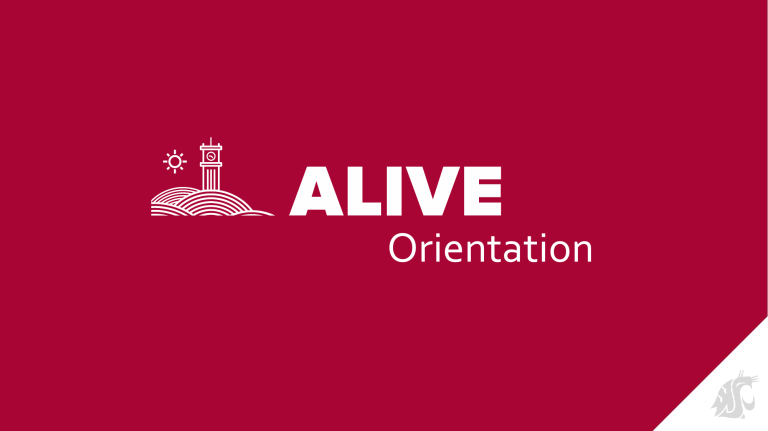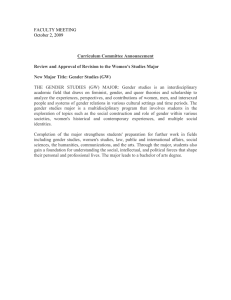
Orientation College of Arts and Sciences: Humanities & Social Sciences Welcome to this presentation about the Humanities and the Social Science degrees in the College of Arts & Sciences! Goals for this presentation: 1. To better understand the value of these degrees 2. To learn about the wide variety of majors, minors, options, and certificates available. 3. To understand the importance of engaging in activities that enhance your degree and your experiences at Washington State University. What do we mean when we talk about the Humanities? • The Humanities can be described as the study of how people process and document the human experience. Why is it important to study the Humanities? • Help us understand others through their languages, histories, and cultures; • Foster social justice and equality; • Reveal how people have tried to make moral and intellectual sense of the world. Humanities degrees in the College of Arts & Sciences • English • Fine Arts • Foreign Languages & Cultures • History • Humanities • Music • Philosophy What do we mean when we talk about the Social Sciences? • Social Sciences are disciplines that deal with human behavior in its social and cultural aspects, the study of people and their relationships and interactions in society. Why is it important to study the Social Sciences? • They create better institutions and systems that affect people’s lives; • Help people understand how to interact with the social world, how to influence policy, develop networks, increase government accountability, etc. Social Science Degrees in the College of Arts & Sciences • Anthropology • Criminal Justice & Criminology • History • Political Science • Psychology • Social Sciences • Sociology But wait . . . !!! Not every degree fits entirely under either Humanities or Social Sciences! Interdisciplinary degrees allow students to design and customize their majors, and to choose different ways to approach a subject. Why choose an Interdisciplinary Major? • You may have specific interests that’s won’t necessarily fit in a traditional major; • More flexibility in scheduling classes; • Helps to develop important, transferable skills; and • Helps to narrow down your focus in preparation for a particular career. Interdisciplinary Degrees in the College of Arts & Sciences • Comparative Ethnic Studies • Digital Technology & Culture • Humanities • Social Sciences • Women’s, Gender, and Sexuality Studies College of Arts & Sciences Resources Academic Fact Sheets From this link you will find fact sheets for each degree in the College of Arts & Sciences. You will find information on degree options, admission to the major requirements; suggested classes; math requirements; student clubs; advisor name and contact information – and much more! https://cas.wsu.edu/academic-fact-sheets/ Health Professions Student Center: https://healthprofessions.wsu.edu/ Math Learning Center: http://math.wsu.edu/mlc/ Chemistry Learning Center: https://chem.wsu.edu/chemistry-learning-center/ Pre-Law Resource Center: https://prelaw.wsu.edu/ Keys for Success This site provides information on these and many, many other campus resources for academic success, meaningful engagement, skills development, and professional networking opportunities https://cas.wsu.edu/keys-4-success/ Next, check out our degrees . . . Bachelor of Arts in Anthropology Anthropology is the study of human diversity in all places and at all times, addressing the most fundamental questions about human origins and human nature. Subfields of Anthopology • Archaeology • Cultural/Social Anthropology • Physical/Biological Anthropology • Linguistics Starting Fall 2020: Bachelor of Arts in Human Biology Minor Anthropology Bachelor of Arts in Comparative Ethnic Studies Comparative Ethnic Studies provides students with the opportunity to study the stories and experiences of communities of color, particularly in the United States. It offers understandings of the historical forces and social dynamics of racism and racial inequality worldwide. Minors: • Comparative Ethnic Studies • Popular Culture Bachelor of Arts in Criminal Justice & Criminology Criminal Justice examines the causes and patterns of criminal behavior, the institutions and individuals that work within the criminal justice systems, and the role law plays in the prevention and responses to crime. Minor: Criminal Justice Bachelor of Arts in Digital Technology & Culture Digital Technology & Culture is an interdisciplinary degree that combines the creative production and critical exploration of digital media. DTC emphasizes a historical, rhetorical, and cultural understanding of digital media so as to prepare students for problem solving and communicating both locally and globally. Minor: Digital Technology & Culture Certificate: Game Studies & Design Bachelor of Arts in English English is the study of the English Language in its many forms, including its literatures, technologies, and cultural functions. It involves applied skills in reading, critical thinking, and various kinds of writing – creative, professional, and analytical – in a range of contexts, including print and electronic media. Bachelor of Arts in English Major Options Minors Certificates Literary Studies English Editing & Publishing Rhetoric & Professional Writing Creative Writing Professional Science & Technology Writing Creative Writing Linguistics Professional Writing English Teaching Humanities Teaching English as a Foreign Language Integrative English Studies Professional Writing Linguistics Film Studies The arts are vital to cultural expression; they enrich our lives while challenging and broadening our views of the world. The Fine Arts faculty fosters an educational environment that encourages creativity, individual growth, and meaningful expression through interdisciplinary approaches to the practice of art and the study of visual culture. Bachelor of Fine Arts (BFA) Bachelor of Arts in Fine Arts Drawing Art History Painting General Art Sculpture Studio Arts Ceramics Photography Minors Digital Media Art Printmaking Art History Exhibition Studies Bachelor of Arts in Foreign Languages & Cultures Foreign Languages & Cultures is the study of languages other than English as well as the cultures where these languages are spoken. Studying a foreign language enables development of global and cultural understanding and foreign language proficiency is an important tool in many professions. Major Options: Second Major for the Professions Options: Chinese French French German Japanese Japanese Spanish Spanish Bachelor of Arts in History History is the ongoing effort to understand the diverse people, institutions, and cultures of the past. Historical inquiry builds knowledge of past events and in doing so helps inform the decisions we make about our future. Major Options: Minors: General History History History Pre-Law Asian Studies History Education War & Society Social Studies Education Bachelor of Arts in Humanities Bachelor of Arts in Social Sciences Students consider personal, academic, and career goals to design multidisciplinary degree programs in the humanities. The unique “student-centered” plans result from students’ focus on individual values, interests, and abilities to achieve fulfillment of lifelong personal, educational, and professional goals, Bachelor of Arts in Music Bachelor of Music Music is art in sound, universally beloved and an essential part of every culture on earth. People around the world use music to worship, communicate, commemorate, celebrate and share their deepest emotions, to express what words cannot. Options: Minors: Composition Music Performance Jazz Studies Teaching Music Technology Bachelor of Arts in Philosophy Philosophy is the attempt to answer certain broad-ranging, fundament questions: What sorts of things can we really claim to know? What is ultimately real? What makes for a morally right act or just society? Faculty specialize in bioethics, ethical theory and applied ethics, metaphysics, epistemology, philosophy of language and science, and the philosophy of religion. Major Options: Minors: General Philosophy Philosophy Pre-Law Ethics Bachelor of Arts in Political Science Political Science focuses on the uses and consequences of public authority in the allocation of societal resources. Faculty focus on problem-driven research that confronts both traditional and emerging challenges in the United States and throughout the world. Options: Minors: General Political Science Political Science Global Politics Pre-Law Bachelor of Science in Psychology Psychology is the scientific study of behavior and the mental processes that determine behavior. Psychology also applies the accumulated knowledge of this science to practical problems. Minor: Psychology Bachelor of Arts in Sociology Sociology looks at society from every angle and it aims to answer questions about why and how we group together to form societies, as well as the individual’s roles within society. Sociologists study a range of issues, from inequality to human ecology, from deviance to religion, from medicine to politics. Minors: Sociology Workplace Diversity At-Risk Youth Certificate: Organizational Leadership in Sustainability Bachelor of Arts in Women’s Studies The Program in Women’s, Gender, and Sexuality Studies at WSU offers interdisciplinary courses in which students work together to explore the ways that race, ethnicity, sexuality, social class, nationality, age, and ability intersect to shape understanding of gendered experience and injustice. Minors: Women’s Studies Queer Studies Your college experience is not only about going to class and earning good grades! Good grades are great, but to get the most from your years in college, you must find ways to engage in your major, and discover the many ways you can develop skills that will help distinguish you in a competitive world – and you’ll have a good time, too! There are many ways to do just that, including: • • • • • • • • Connect with faculty. It’s true – they really do want to know you and to help you! Join and participate in clubs and organizations – we have something for everyone! Participate in one of the many, many programs to study abroad. Find ways to develop your leadership and professional skills. Visit with a career counselor Explore internship options – they often lead to job offers! Participate in service learning opportunities. Get to know your academic advisor. They are a great resource! I First Semester CHALLENGE Start off right by attending the CAS Spring 2021 Week of Welcome Kick-Off! Schedule a meeting with an Education Abroad counselor Begin your search for internship opportunities Find ways to connect with faculty Take classes that allow you to explore new areas of interest Approach faculty about undergraduate research opportunities Fine meaningful ways to use what you learn in the classroom in the real world! and You can apply to be a College of Arts & Sciences Student Ambassador! Arlene Parkay Assistant Director of Recruitment & Retention College of Arts & Sciences Cas.wsu.edu parkaya@wsu.edu 509-335-6708 (office) 509-432-3357 (cell/text) Contact me if you have questions Follow Us @WSUPullman #WSUAlive

